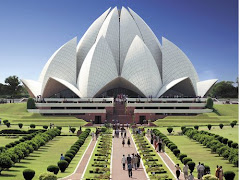When it comes to spare time, I imagine that its quality is dependent on the worthiness of the values we are led by in choosing what to do. Service to mankind and to minister to the needs of the people is the highest station we can aspire to. As His Holiness the Christ said, "the last shall be the first." He prided himself in being the servant of all the rest, ministering to his disciples instead of being ministered to. The importance of this vision or principle to our happiness becomes all the more clear when we consider the many obstacles to maintaining the vision before us. 'Abdu'l-Bahá has likened such obstacles to lesser gods that we make for ourselves out of ignorance (=superstition), and go about worshiping. We can overcome these superstitions in ourselves by thinking "scientifically." Shoghi Effendi has explained that the Bahá'í Faith is "scientific in method"1. 'Abdu'l-Bahá has highlighted the two sources of guidance to man, science and religion:
God made religion and science to be the measure, as it were, of our understanding. Take heed that you neglect not such a wonderful power. Weigh all things in this balance.
Both these measures - religion and science - are connected with experience (=sensing the various gifts of life). The more varied experience we get, the more accurately we probably are able to use the tools of religion and science in our lives. That is why I would encourage my students to seek out new experiences so as to gain a solid basis upon which to write an essay. A person living enclosed in a room all his life wouldn't have much varied experience to write about!
Another advantage of seeking out new experiences is that it can increase our awareness of the enormously multifaceted world we live in, and ultimately help us discover who we ourselves are and what role and place we have in this great drama which is life. Our ability to solve new problems will likely increase with our experience, as will our learning. Every people, culture and nation has its own special insights which the traveler in search of knowledge can gain. 'Abdu'l-Bahá connects these varied activities with every good thing in life when He says:
...the happiness and greatness, the rank and station, the pleasure and peace, of an individual have never consisted in his personal wealth, but rather in his excellent character, his high resolve, the breadth of his learning, and his ability to solve difficult problems.
-- Abdu'l-Baha, The Secret of Divine Civilization, p. 23-24
To solve difficult problems, to understand the problems of the world one lives in, to set high goals for oneself, and to reflect on and refine one's character in light of religious teachings, all lead to our happiness and greatness, our high rank and station, to our pleasure and peace. What greater gifts could we aspire to than these? But since nothing comes for free in life, we would do well to focus on these means by which we can achieve these things. Once again, they are an excellent character, high resolve, breadth when it comes to learning, and the ability to solve difficult problems.
It is likewise essential in this regard to allow time for reflection in one's life: "One hour's reflection is preferable to seventy years of pious worship," writes Bahá'u'lláh. Such quality reflection time must be an integral part of the aforementioned four areas of focus above. 'Abdu'l-Bahá says:
It is an axiomatic fact that while you meditate you are speaking with your own spirit. In that state of mind you put certain questions to your spirit and the spirit answers: the light breaks forth and the reality is revealed. ...To illustrate this, think of man as endowed with two kinds of sight; when the power of insight is being used the outward power of vision does not see.
The continuation of this passage underscores the awe-inspiring potentiality and unnumbered blessings that derive from this practice:
This faculty of meditation frees man from the animal nature, discerns the reality of things, puts man in touch with God. This faculty brings forth from the invisible plane the sciences and arts. Through the meditative faculty inventions are made possible, colossal undertakings are carried out; through it governments can run smoothly. Through this faculty man enters into the very Kingdom of God.
We "enter into the Kingdom of God", while still on earth! Even so, we have the ideal of moderation: meditation, action and reflection (evaluation of the action) must go hand in hand, and form a recurring cycle to which we accustom ourselves. Our lives will thus become dynamic as we leave our material, pleasure-seeking selves behind in the pursuit of meaningful action governed by the ideal of service to our fellow human beings. This service is then followed by reflection over the experience gained, where we can make the necessary adjustments to our action, and start the cycle over again.
The wheel of life has then been closed, expanding its circle of influence with every turn, and drawing us nearer to the Source of our beings:
O My Brother! A pure heart is as a mirror; cleanse it with the burnish of love and severance from all save God, that the true sun may shine within it and the eternal morning dawn. Then wilt thou clearly see the meaning of "Neither doth My earth nor My heaven contain Me, but the heart of My faithful servant containeth Me." And thou wilt take up thy life in thine hand, and with infinite longing cast it before the new Beloved One.
Bahá’u’lláh, The Seven Valleys And the Four Valleys
Notes:
1. From a statement prepared by Shoghi Effendi for the United Nations Special Committee on Palestine, July 1947.






